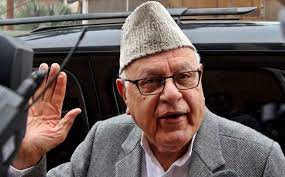Farooq Abdullah Expresses Concern Over Rising India-Pakistan Tensions
Srinagar, 02 May 2025: Amidst heightened hostilities between India and Pakistan following the recent terror attack in Pahalgam, National Conference (NC) president Farooq Abdullah has expressed deep concern about the situation in Kashmir. On Thursday, Abdullah stated that Kashmir is “passing through a difficult time” as the two nuclear-armed nations appear to be “preparing for war.”
Farooq Abdullah’s statement reflects the growing anxiety in the region over the deteriorating relationship between India and Pakistan. The tensions have escalated in the aftermath of the deadly terror attack that occurred on April 22nd at Baisaran meadow in Pahalgam, a popular tourist destination in the Anantnag district of Jammu and Kashmir.
In that attack, a total of 26 people, comprising 25 tourists and one local resident, were tragically killed. The Resistance Front (TRF), believed to be a proxy outfit of the proscribed Lashkar-e-Taiba (LeT) militant group, claimed responsibility for the attack. This attack has further strained the already fragile relations between India and Pakistan, leading to increased tensions and cross-border exchanges.
“Kashmir is passing through a difficult time. Nobody knows what will happen tomorrow. Both countries are preparing for war. The rest of the world is making efforts to prevent it and find a way to capture those who committed this (Pahalgam attack) and take their handlers to task. Only God knows how much the world will be able to stop it,” Farooq Abdullah told reporters, highlighting the precariousness of the current situation.
The attack has triggered a series of diplomatic and political responses from both India and Pakistan, further exacerbating the already tense atmosphere. Relations between the two nations have been strained for several years, and this recent incident has pushed them to a new low. Both countries have declared a series of punitive measures, and there has been a significant increase in rhetoric from both sides.
Pakistan has repeatedly asserted that India is planning to launch an attack in the aftermath of the Pahalgam attack. Simultaneously, India has accused Pakistan of supporting and harboring terrorist groups operating across the border. This war of words has been accompanied by a sharp spike in ceasefire violations from the Pakistani side along the Line of Control (LoC) and the International Border (IB), raising concerns about a potential escalation of hostilities.
Farooq Abdullah, a veteran politician and a prominent voice in Kashmiri politics, described Pakistan as a “failed state,” reflecting a widely held view in India. He criticized Pakistan for allegedly focusing on supporting terrorism rather than addressing its internal issues and improving the lives of its citizens. “Instead of improving their country, they have taken this route (of terrorism). The result will be dangerous if war starts, because both (nations) have atomic power,” he warned, underscoring the catastrophic consequences of a potential conflict between the two nuclear-armed neighbors.
When asked whether war was the “last option” in resolving the ongoing tensions, Farooq Abdullah stated, “I can’t say. This has to be decided by the leadership of the two countries,” indicating the complex and unpredictable nature of the situation and the ultimate responsibility of the political leadership in both nations.
Abdullah also expressed his view that the relationship between India and Pakistan is unlikely to improve significantly unless there is a “people’s government” in Pakistan, implying that a more democratic and civilian-led government in the neighboring country might be more conducive to peaceful relations.
In addition to the geopolitical tensions, Farooq Abdullah also addressed the issue of Pakistani nationals being deported from India. He expressed his concern about this issue, stating that the deportation of “common people settled here for decades” is “against human values.” He acknowledged that the decision in this matter rests with the central government but emphasized the humanitarian aspect of the issue, arguing that such actions are not in line with basic human decency.
Finally, Farooq Abdullah commented on the recent announcement of a caste census by the central government. He welcomed this move, indicating his support for measures aimed at addressing social inequalities and promoting social justice. He also addressed the reported attacks on Kashmiris in different states of the country, stating that the governments of Jammu and Kashmir and other states are “looking into it,” suggesting that authorities are taking steps to address these concerns and ensure the safety and security of Kashmiri residents across India.
Farooq Abdullah’s statements highlight the multifaceted challenges facing the region, including the escalating tensions between India and Pakistan, the internal political dynamics within Jammu and Kashmir, and the broader social and humanitarian concerns affecting the people of the state. His words serve as a reminder of the urgent need for dialogue, restraint, and a commitment to peaceful resolution of conflicts in the region.


